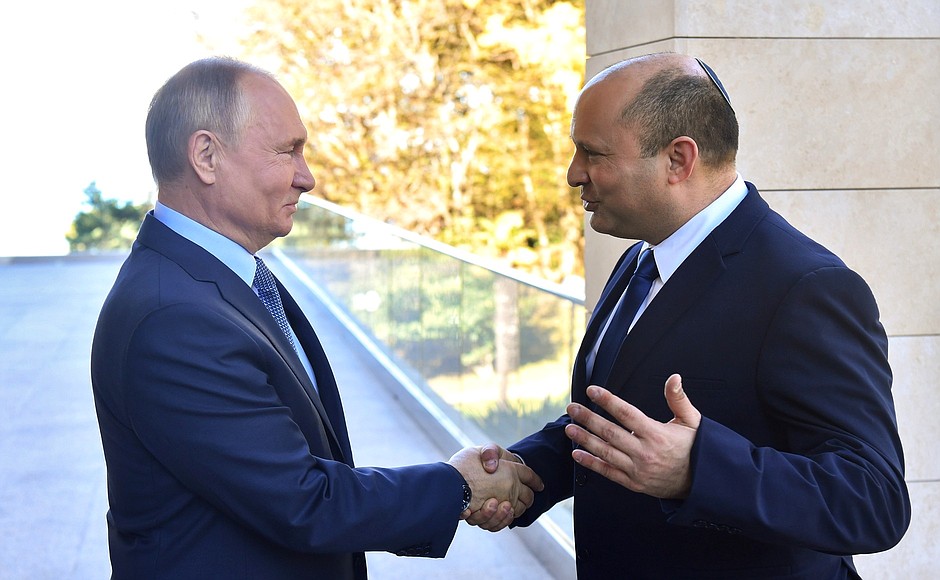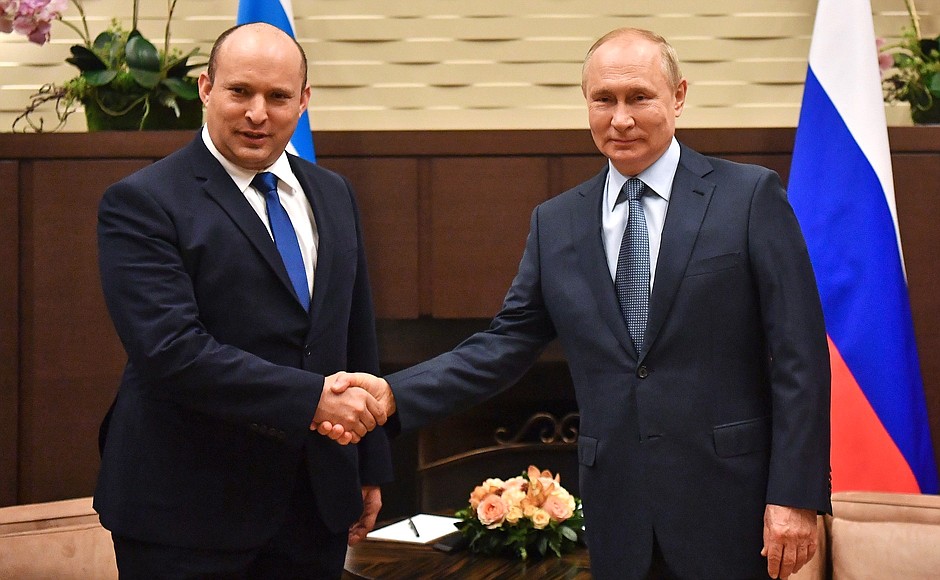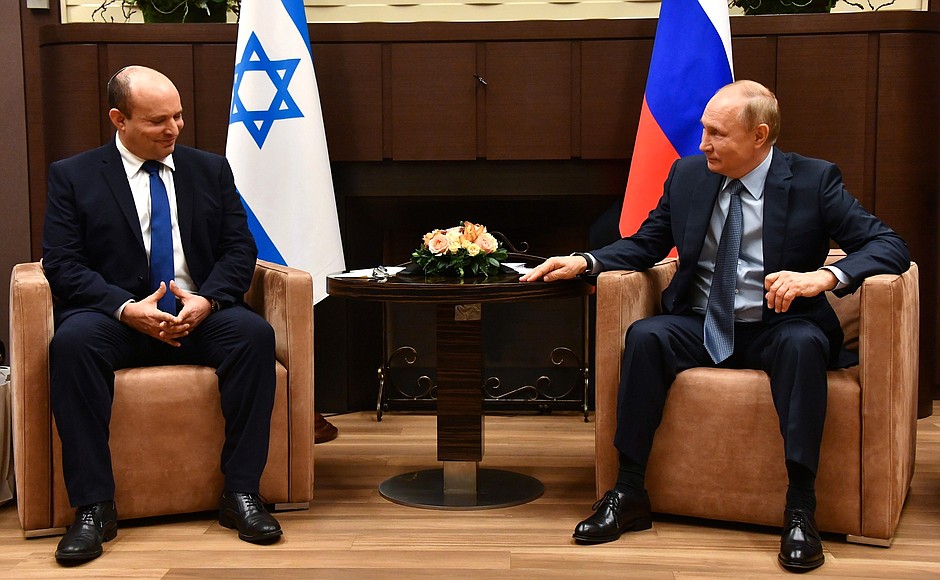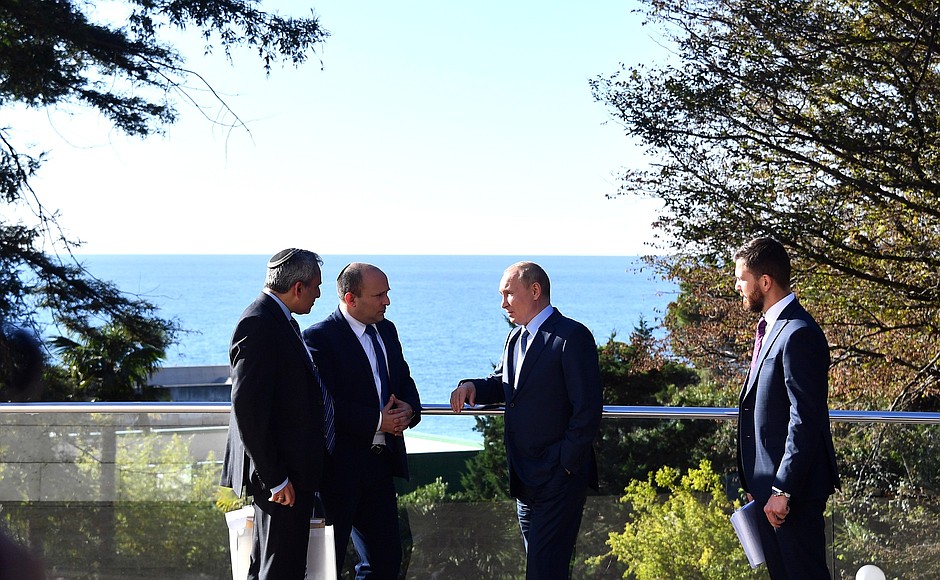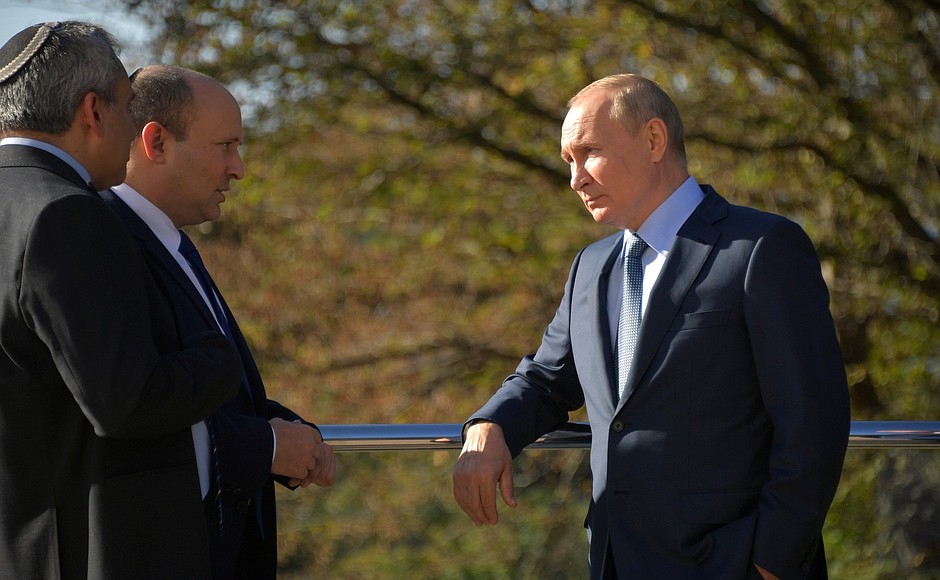Start of Russian-Israeli talks
President of Russia Vladimir Putin: Mr Prime Minister,
First of all, I would like to thank you for accepting my invitation and coming to Russia. Let me congratulate you once again on assuming the post of Prime Minister of Israel. It could be said that your visit is timed to coincide with the 30th anniversary of the resumption of diplomatic relations.
During this period, Russia and Israel have developed relations that are unique, to a certain extent, and there are good grounds for this. Firstly, the Soviet Union, and this country as its legal successor, stood, in effect, at the origins of the State of Israel. Secondly, Israel has what is probably the biggest Russian-speaking community outside of Russia, which includes many surviving veterans of the Great Patriotic War, and we feel special warmth towards these people.
It should be said that our trade and economic ties are developing successfully, even though they are still modest in terms of volume. During the first seven months of this year, trade has grown by 50 percent despite all the pandemic restrictions. And this is a very important component. There are also interesting areas – we discussed this with the former Israeli government – such as the hi-tech branches of the economy.
Of course, it would be very interesting and useful for me to exchange information with you on the situation in the region. As you may know, we are taking efforts to restore and strengthen Syrian statehood. There are problems in this regard, and they are numerous. But there are also points of contact and opportunities for cooperation, especially where matters related to fighting terrorism are involved.
In general, we have many issues that we can and should discuss. I am quite hopeful that despite the domestic political battles – and they are inevitable for any state – your government will pursue a policy of continuity with regard to Russian-Israeli relations. We have developed sufficiently business-like and trust-based relations with the previous government.
In any event, we are glad to see the head of the Israeli Government in Russia. Welcome!
Prime Minister of Israel Naftali Bennett (retranslated): Thank you very much for the warm welcome, Mr President.
Relations with Russia – these days, we are symbolically celebrating the 30th anniversary of their resumption – are very special relations for Israel both because of our common past, and because of our present and future. We remember the past quite well, the immense efforts undertaken by the people of Russia and the Red Army to win victory over Nazi Germany in World War II. This was perhaps the most critical moment in the history of the entire world and, of course, that of the Jewish people.
It is our responsibility to pass on to future generations the feeling of gratitude that we have towards Russia through the dialogue we conduct, and through the historical documents, and even through the monuments we build. For example, the monument to the Russian soldier in Netanya and the monument to the victims and survivors of the Siege of Leningrad in Jerusalem are two monuments where you, Mr President, took part in their unveiling ceremonies while you were in Israel. As a person who paid much attention to the study of history, I cannot but appreciate the tremendous contribution and efforts of the Russian people and the huge price that they paid for Victory.
Mr President, I would like to tell you that we are completing the implementation of a major project – a new museum commemorating the Jewish soldiers who fought with the Allied armies during World War II, primarily, of course, the Red Army that had half a million Jewish soldiers, and 200,000 perished at the fronts. This will be a large museum and it will be named after the late President Chaim Herzog, father of the current incumbent Isaac Herzog. I would be glad to give you details about the museum during our conversation.
I would be glad to discuss with you many subjects related to our current cooperation and to the development of our economic, scientific, and cultural cooperation.
We in Israel have one million Russian-speaking “ambassadors.” They are making a huge contribution to the State of Israel, they are bringing great influence to bear on my country through the culture they have brought along, through their mentality and work culture, as well as through their achievements.
I would like to tell you a story that occurred earlier this week. I was visiting a wounded soldier at a hospital. His mother is a Russian-speaking Israeli. This was his second serious wound in the course of this year. I said: “I am Prime Minister of Israel, I am eager to help you. What can I do for you?” He replied: “All I want is to be back ASAP at my combat unit.”
We will discuss in detail, I am sure, Mr President, our economic cooperation. As you rightly said, we have much potential and we are able to actively boost our trade.
We will certainly discuss the situation in Syria and the ongoing efforts to stop the Iranian nuclear programme.
I would like to say in conclusion that our entire dialogue and all our relations are based on a very profound bond between our countries and peoples.
Mr President, you have spent 20 or even more years consolidating links between our countries and you have brought them to this level. I would like to tell you on behalf of our country and all our people that we see in you a very dear and real friend of the State of Israel and the Jewish people.
(In Russian) Spasibo.
